Surface Controls and Values
Use the surface controls and values to define the mesh controls that you want to modify–including wake refinement.
You can modify several mesh controls using a surface control.
Controls – Non-Wake Refinement Properties
For the mesh controls that are listed, you can specify the properties as relative or absolute.
- Target Surface Size
- Minimum Surface Size
- Prism Layers
- Surface Curvature
- Surface Proximity
- Surface Growth Rate
- Surface Remeshing
- Trimmer Surface Growth Rate
|
Control |
Specify Custom Value |
Allows you to specify a value for this control that overrides the default control. |
|
Use Parent Value |
Uses the same value as the default control. |
|
|
Disable |
Does not apply the selected mesh control to the surfaces. This option is only available for the Surface Curvature, Surface Proximity, Surface Remeshing, and Prism Layers controls. |
|
|
Enable |
Applies the selected mesh control to the surfaces. This option is only available for the Surface Remeshing control. |
Controls – Wake Refinement Properties
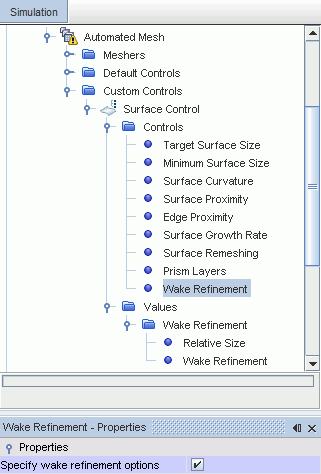
The following wake refinement mesh controls allow you to activate wake refinement and specify wake refinement options:
- Remesher Wake Refinement – appears when you use the Surface Remesher along with the Trimmed Cell Mesher
- Trimmer Wake Refinement – appears when you use the Trimmed Cell Mesher
- Wake Refinement – appears when you use either the Surface Remesher, Polyhedral Mesher, or Tetrahedral Mesher individually, or when you use the Surface Remesher along with either the Polyhedral Mesher or Tetrahedral Mesher
|
Control |
Activated |
A node is created which has properties and sub-nodes that allow you to set values for the wake refinement. |
|
Deactivated |
Wake refinement does not occur. |
Values – Wake Refinement Properties
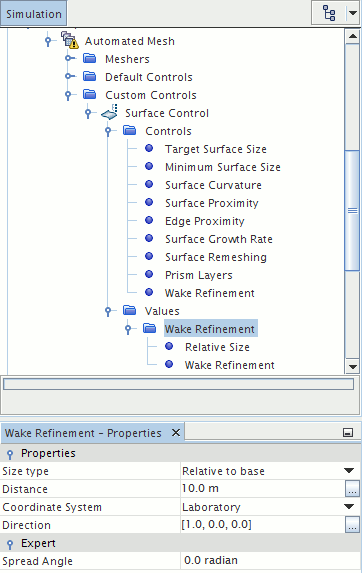
| Size Type | Relative to base | Creates a Relative Size sub-node which allows you to define the upper limit of cell sizes in the wake area as a percentage relative to the base size. |
| Absolute | Creates an Absolute Size sub-node which allows you to define the upper limit of cell sizes in the wake area as an absolute size. | |
| Distance | The distance that the wake extends from the selected surface or curve. | |
| Coordinate System | The coordinate system for the wake direction. Once a Cartesian coordinate system has been defined, it can be selected using the pull-down menu. | |
| Direction | The direction that the wake extends from the selected surface or curve with respect to the selected coordinate system. | |
Values – Wake Refinement Expert Properties
| Spread Angle | The angle to which the wake refinement spreads from the specified wake refinement direction. | |
The following examples show wake refinement that is specified for a surface control on the exterior of a car. The spread angles that are specified below are 10 degrees and 20 degrees from the -Z direction:
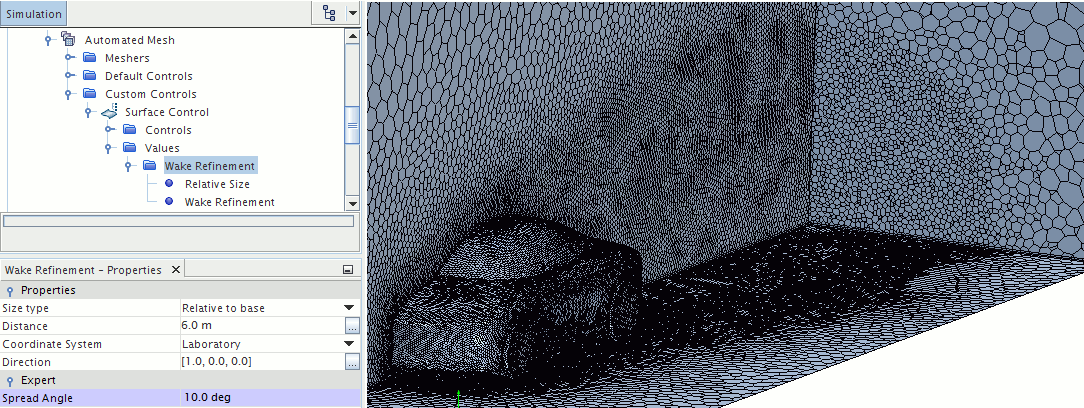
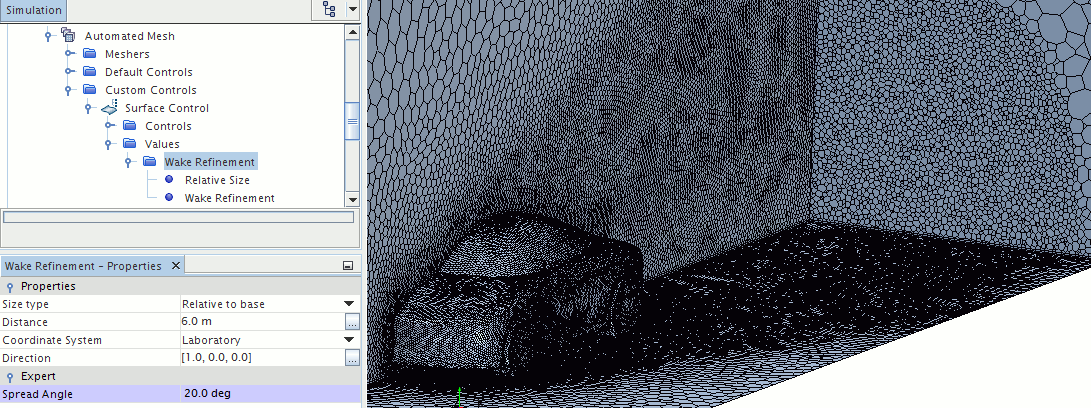
Values – Wake Refinement Sub-Nodes Properties
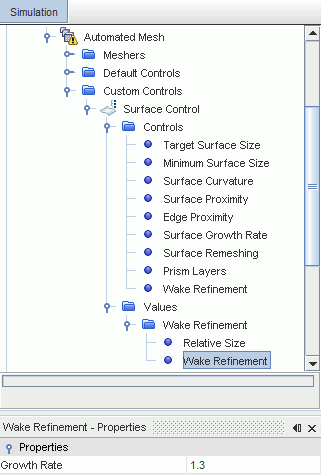
The sub-nodes that appear under the node depend on the volume meshing model that the wake refinement is specified in.
- You specify wake refinement in either the Surface Remesher, Polyhedral Mesher, or Tetrahedral Mesher individually
- You specify wake refinement in the Surface Remesher along with either the Polyhedral Mesher or Tetrahedral Mesher
However, if you specify wake refinement in the Trimmed Cell Mesher, the node appears. If you specify wake refinement in both the Surface Remesher and the Trimmed Cell Mesher, the node also appears.
The Properties of these sub-nodes are as follows:
| Growth Rate | Available for the Wake Refinement and Remesher Wake Refinement sub-nodes. Allows you to control the speed of cell growth through the wake. The cell size grows from the part surface or part curve into the volume of the wake. The cells within the wake stop growing when the cell size reaches the specified maximum cell size within the wake. | |
| Default Growth Rate | Available for the Trimmer Wake Refinement sub-node. Controls the stepping from one cell size to the next within the wake. | |
| Fast | This setting usually equates to having only one layer of each cell size for each transition, which results in the least number of cells being created for the supplied input values. | |
| Medium | Gives a minimum of two equal sized cell layers per transition. | |
| Slow | Gives a minimum of four equal sized cell layers per transition. | |
| Very Slow | Gives a minimum of eight equal sized cell layers per transition. | |
| Custom | Adds a Custom Surface Growth Rate sub-node which allows you to specify the number of cell layers per transition. | |
| Surface Growth Rate | Available for the Trimmer Wake Refinement sub-node. Determines the number of cell layers to grow in the transition from cells next to surfaces to cells in the core volume. | |
| Disable | Default setting. The default growth rate is also applied to cell layers next to surfaces. | |
| Fast | Sets one cell layer next to surfaces. | |
| Medium | Sets two cell layers next to surfaces. | |
| Slow | Sets four cell layers next to surfaces. | |
| Very Slow | Sets eight cell layers next to surfaces. | |
| Custom | Adds a Custom Surface Growth Rate sub-node which allows you to specify the number of cell layers per transition. | |
| Customize Anisotropic Size | Available for the
Trimmer Wake Refinement sub-node. When activated, the Relative or Absolute size that is set for the parent wake refinement node is not acknowledged. Activating this property creates a set of sub-nodes which allow you to set a custom cell size for each coordinate direction relative to the trimmer coordinate system.
 |
|